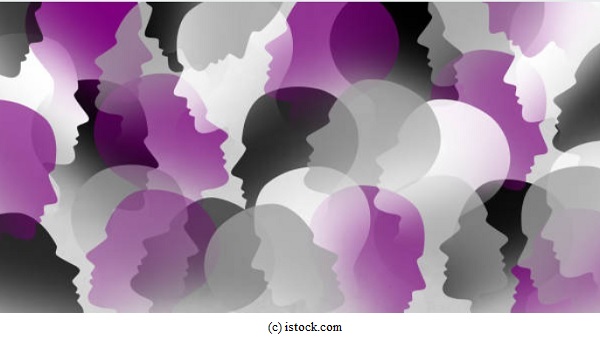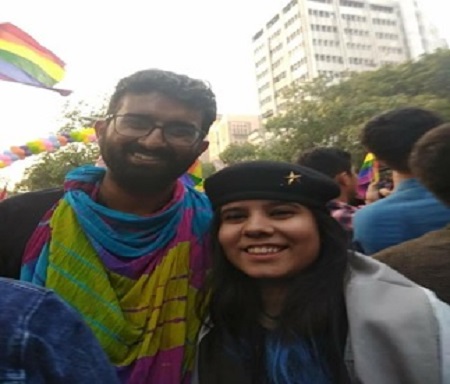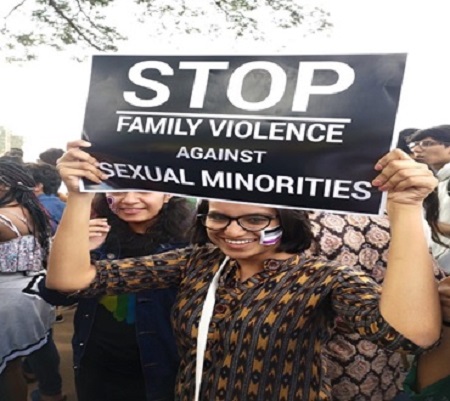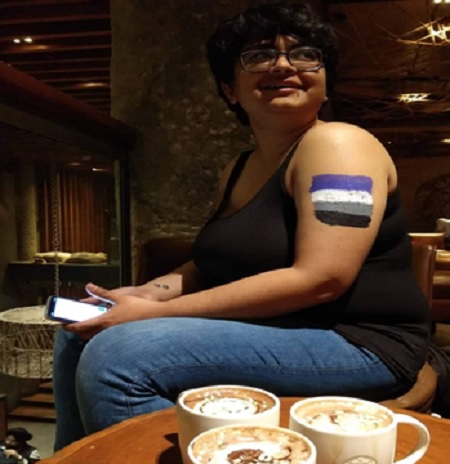Dec 18, 2025
Dec 18, 2025
by Sneha Mothey
This article has been jointly written by Sneha Mothey, Divya Shree, Harshita Arya, Samrah Attar, and Yagnoseni Das. They are students at Symbiosis Institute of Media and Communication.

“We are treated as lab rats on whom people can experiment. It becomes very exhausting and lonely when people equate love with sex.” - Meghna Mehra
In a country where “the talk” is taboo, a community that often gets overlooked when there is a discussion on the inclusion of sexual and gender minorities is the asexuals. Across India, a growing group of individuals are identifying as asexuals and are gradually coming out to themselves and the world. The anonymity that the Internet allows, seems to be the first step.
“Asexuality is a fluid spectrum” - Asexuality India
Asexuality is a sexual orientation where a person does not experience any sexual desires, unlike homosexuality and heterosexuality. It is also the one that is widely misunderstood. Every asexual person experiences their sexuality differently than the rest. A sexual orientation with a vast spectrum, asexuality cannot be measured by a yardstick.
In the book, ‘The Invisible Orientation: An Introduction to Asexuality’ by Julie Sondra Decker, the author said that asexuals experience little to no sexual attraction, and some, experience a significant amount of sexual attraction. Asexuality can be subdivided into several categories out of which demi romantics, demisexuals, grayromantic, graysexuals, fray romantics and fraysexuals are the most researched ones.
The Realization
The act of coming out of the closet has been a significant landmark in the lives of the people of the LGBTQIA+ community. Some consider this an act of embracing their true selves. While others do not see the point and find it hypocritical to ‘come out’ as it makes heterosexuality and allosexuality seem like the default sexual orientation.

Meghna Mehra (image cc: Meghna Mehra)
Meghna Mehra is an author, founder of All India Queer Association and an asexual student leader. Speaking on how she realised she is an asexual, she recalled her early childhood and teenage years. A survivor of paedophilia, any sexual advances would cause her distress. Though she dated a lot as a teenager, she says she never felt any sexual attraction towards any of them. She brushed it off by convincing herself with various reasons. It was not until her second year of graduation that she came across the term “asexuality.” It described her perfectly.
“It was a moment of catharsis that I finally know why I feel the way I feel, that it’s a legitimate orientation and there is nothing wrong with me. It made me feel amazing,” she said.
Coming out is hard, dealing with the response, even harder.
”I spent years struggling to accept myself as an asexual and when I finally did, I wanted to find people like myself. Many of us are told we cannot be happy or form meaningful relationships without sex. I wanted us to be able to come together and share stories that proved otherwise,” Jay, the founder of AVEN (The Asexual Visibility and Education Network) shares with the Hindustan Times.
Bhavesh Arora, 23, has not come out to his family. He fears they might treat him differently and deem his sexual orientation to be abnormal. He also dreads the possibility of his parents taking him to a sexologist or a psychiatrist for the treatment of this ‘disease’. But his friends were his allies and even showed genuine curiosity about asexuality.
Asexuals’ struggles do not just end at or after coming out. The real challenge for them is facing the unending unsolicited opinions and judgements that they receive regularly.

Sweta Reddy (image cc: Sweta Reddy)
“It's hard especially on my mental health to take in all the negative responses. The stereotypes, dismissal of my identity, misinterpretations of my feelings are hurtful. A couple of people tried to convince me that I have psychological issues and have advised me to see a therapist. It was so easy for them to call me broken and mentally ill. It took a toll on me but I stood up for myself,” said Sweta Reddy, founder of Aces of Hyderabad.
Rahul Singh* struggles to make people understand the difference between sexual and romantic feelings. “Bahut logon ke liye yeh counter-intuitive ho jata hain (Many find it counter-intuitive). A lot of effort goes into helping them unlearn this notion,” he further adds.
Meghna doesn't open up about her orientation to her employers. She has lost several job opportunities after they found out about her sexual orientation. “My boss said that I cannot be a part of the organisation because I am a member of the LGBTQ+ community and he did not want ‘those' people working there,” she added.
“There are times when I try to explain to people about asexuality and they assume that I am either celibate or infertile. Many of them go as far as thinking that I am attracted to non-human things,” says Neel, a 16-year-old student of Bhavan's Gangabux Kanoria Vidyamandir (BGKV) in Kolkata.
Myths and Misconceptions
Myths are the residues of lack of knowledge and ignorance about a topic. When not addressed with reliable facts they multiply and spread like wildfire. Most asexuals at some point in their life have come across a claim which is simply untrue. Some aces shared their most memorable ones.

Shambhavi (Image cc: Shambhavi)
Shambhavi, a communication officer of a feminist organisation, while recalling the myths that she came across said, "Someone once told me that a baby is born asexual if there is a complication during the third trimester of a pregnancy."
Rahul Singh* said the most absurd comment that he has ever heard is, ”Bro tu asexual kese? Tu paudha hai kya? (How are you an asexual? Are you a plant?)
Meghna Mehra received a lot of weird and creepy remarks from heterosexual men. She said, “Their beliefs are so twisted that they think if we (asexuals) have sex with them, we will be cured and become straight which is very scary and predatory.”
“Asexuals are often confused with agenders, I was once questioned about my genitalia on a dating website,” shares Bhavesh.
‘One person even called me and said “Tum bhagwan ke avatar ho,” I asked them which one? Hinduism alone has 33 crore gods.’- Meghna Mehra
Aces, a part of the pride community?
Asexuals have faced a fair share of discrimination from the LGBTQ+ community as well.
“It is evident that asexuals are outlawed in many queer spaces. Hetero romantic aces are dismissed by being told that they are straight anyway. But I think most queer folks are more open to educating themselves than others. With time, queer spaces are definitely becoming more inclusive and accepting us as a part of them,” said Sweta Reddy.
“I came out very recently, so I am really new to the community. People of all communities have been quite welcoming. There have been no forms of gatekeeping but I have heard of people who believe that asexuality is not a part of the LGBTQ community. I have not experienced this ever but yes, I have heard about them,” shares Rahul Singh*
Meghna comments, “Asexuals face discrimination within and outside the community. I had no idea that asexuality even existed because there is a lot of asexual erasure within the community itself. I faced a lot of sexism from within the community too. Even today a lot of people in the queer community refuse to acknowledge that asexuality is a valid sexual orientation and say that we are straight. It becomes very discriminatory.”
Coming Out of a Closet(ed) Mindset
With the lack of representation of asexuals in the media and contemporary society, the spectrum which is already unheard of gets lost within the sea of labels. However, the prevalence of social media platforms, in ways, has helped in bridging the gap between the information and the recipients. Some aces give us a glimpse at their thoughts and predictions for the future.
“The characters in the stories that you are told usually grow up, have children and grow old and all of that consist of some sort of partnership. There is no such story or a script for an ace person to follow,’ she says. According to Sambhavi, asexual people are often made to feel that they must be okay with the institution of marriage and force themselves in a heteronormative relationship to fit in,” shares Shambhavi.
Sweta says, “I am glad that we have a few Indian communities for asexuals. But when it comes to the awareness about asexuality, we aren’t really moving forward. I have been in many gender studies conferences and classes, and asexuality is rarely brought up. Asexual representation in any space is nearly zero. We asexuals struggle to find role models who are like us. I believe the future holds a lot of hope for our community to be heard and be visible.”
Suresh is an activist who works closely with Sangama, an NGO which fights for sexual minorities and opposes “cisnormative” sex education. The organisation conducts workshops educating the masses with a rainbow spectrum of sexual, gender identities, including queer, two-spirit, asexuals, pansexuals.
While the community is doing an amazing work in raising awareness and normalising asexuality, the onus is also on us to be better allies.
“Accept them as they are. Do not try to cure them by taking them to doctors and babas of this country. Please. Give them mental support and emotional support. That’s very important for them to accept themselves,” says Vinay Ramnath.
*Names have been changed to protect privacy.
08-May-2021
More by : Sneha Mothey